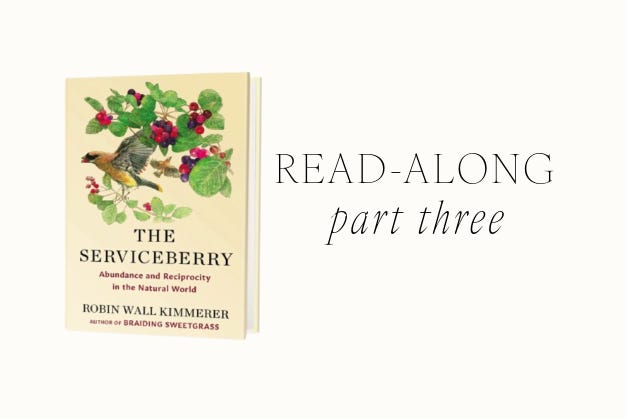Welcome to the Feel Good Read-Along! Where each season we read a book together that leaves us feeling good.
For Winter we’re reading The Serviceberry by Robin Wall Kimmerer.
This is the final of three discussion posts. We’ll be discussing chapters six, seven and the closing invitation.
“Thriving is possible, only if you have nurtured strong bonds with your community.”
This really speaks to the point Kimmerer is making here as she nears closing out the book - interdependence and co-evolution are at the heart of ecological economics.
COOPERATIVE ECONOMICS
“I lament my own immersion in an economy that grinds what is beautiful and unique into dollars, converts gifts to commodities in a currency that enables us to purchase things we don’t really need while destroying what we do.”
“The Serviceberries show us another model, one based upon reciprocity rather than accumulation, where wealth and security come from the quality of our relationships, not from the illusion of self sufficiency.”
We are prompted to again see gratitude and reciprocity as essential foundations for an economy, a full circle moment.
The discussion continues around economies, exploring how competition makes sense only when we focus on the individual, but when we focus on a group cooperation is the better model.
This quote shared from writer Richard Powers really sums this up: “You cannot compete in a zero sum game with creatures on whom your existence depends.” If you, too, read his novel The Overstory this may have hit as powerfully as it hit me.
Despite this knowing, and that natural selection favors those who can avoid competition, we learn that we as humans continue to operate on competition.
Where in your life can you fuel cooperation instead of competition?
SCARCITY
Natural selection teaches us another lesson - if there isn’t enough of something, find something else. Could this specialization to avoid scarcity be relevant to us as humans as well? It makes me think about embracing our wonderfully unique selves and the gifts that we each possess, different from the other.
“What if scarcity is just a cultural construct, a fiction that fences us off for a better way of life?”
There is no scarcity with the Serviceberries. What can we learn from this?
I love the story of Kimmerer’s neighbor Paulie inviting the neighborhood over to pick Serviceberries during the pandemic. She extends the invitation because the berries are so abundant - “There’s more than enough to share and people can use a little goodness in their lives right now… It feels good to give that little bit of delight.”
How beautiful. We can all stand to share some of our excess goodness.
Kimmerer notes this too: “The ongoing reciprocity of gifting stretches beyond the next customer, though, into a whole web of relations that are not transactional.” Like social capital, being a good citizen, other things like voting for land preservation.
“I cherish the notion of the gift economy, that we might back away from the grinding system which reduces everything to a commodity and leaves most of us bereft of what we really want: a sense of belonging and relationship and purpose and beauty, which can never be commoditized.”
Here here.
“What if our metrics for wellbeing included birdsong, the crescendo of crickets on a summer evening and neighbors calling to each other from across the road?” This sounds like a beautiful life indeed.
How can you prioritize people and measure wellbeing outside of the typical economic measures of money and things?
The book closes on an invitation to become a part of the gift economy, which leaves much to consider beyond the book’s thought provoking stories.
How can we truly reciprocate the gifts of the Earth in our own ways - big or small?
I enjoyed this book so much, and I hope you did too. It’s left me with lots of considerations around how to be a better neighbor and a better steward of the Earth, the giver of so many gifts. Also, how lovely are the illustrations by John Burgoyne?!
If you have any feedback on this read-along or a book suggestion for a future read-along, please leave a comment or send me a message.
Thank you for reading with me! I look forward to hearing your thoughts.









